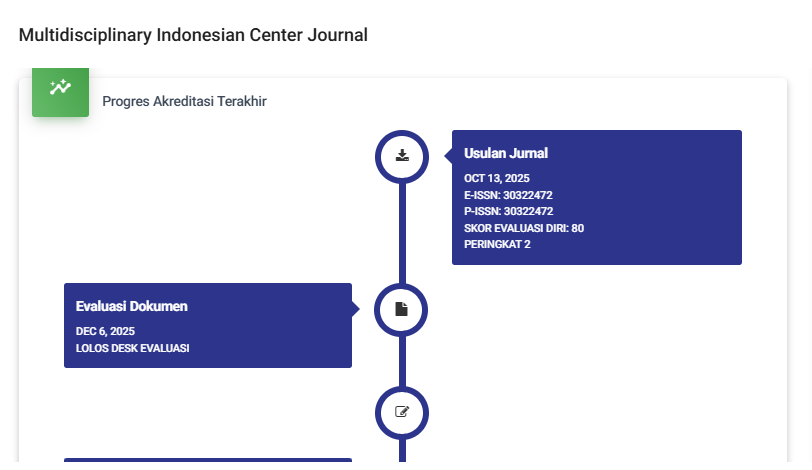AUTOETHNOGRAPHY AND SPIRITUAL EPISTEMOLOGY IN MUSLIM WOMEN’S LIFE WRITING
DOI:
https://doi.org/10.62567/micjo.v2i4.1411Keywords:
reflexive method, gender and faith, Islamic historiographyAbstract
This article explores autoethnography as a form of spiritual epistemology in the study of Islam and gender. Drawing upon feminist hermeneutics and Indonesian Muslim women’s lived experiences, it argues that self-writing is not merely personal expression but a mode of knowing an intellectual and devotional act that integrates reason, emotion, and faith. Using a qualitative reflective framework, the author employs her own journey as a Muslim woman, mother, and doctoral scholar to examine how autoethnography can serve as both method and ibadah ilmiah. The discussion situates this approach within Islamic concepts of tafakkur (contemplation) and muhasabah (self-accounting), connecting them to the works of Amina Wadud, Etin Anwar, and Saba Mahmood. Findings reveal three epistemic dimensions of spiritual self-writing: (1) writing as worship and remembrance, (2) domestic space as an epistemic field of ethical formation, and (3) reflexive authorship as a feminist-spiritual act of reclaiming authority. By merging autoethnography with Islamic historiography, this study proposes an inclusive and embodied mode of scholarship — one that honors lived experience as a source of divine and intellectual illumination.
Downloads
References
Anwar, Etin. Gender and Self in Islam. London: Routledge, 2021.
Barlas, Asma. Believing Women in Islam: Unreading Patriarchal Interpretations of the Qur’an. Austin: University of Texas Press, 2019.
Chang, Heewon. Autoethnography as Method. New York: Routledge, 2008.
Ellis, Carolyn. The Ethnographic I: A Methodological Novel about Autoethnography. Walnut Creek, CA: AltaMira Press, 2004.
Folbre, Nancy. “Measuring Care: Gender, Empowerment, and the Care Economy.” Journal of Human Development 7, no. 2 (2006): 183–199.
Hasan, Noorhaidi. The Making of Public Islam: Piety, Democracy and Youth in Indonesian Muslim Popular Culture. Yogyakarta: Syarikat, 2009.
Hoesterey, James B. Rebranding Islam: Piety, Prosperity, and a Self-Help Guru. Stanford: Stanford University Press, 2016.
Howell, Julia Day. “Modulations of Active Piety: Professors and Televangelists as Promoters of Indonesian Sufisme.” Ethnos 76, no. 3 (2011): 377–401.
Mahmood, Saba. Politics of Piety: The Islamic Revival and the Feminist Subject. Princeton, NJ: Princeton University Press, 2005.
O’Reilly, Andrea. Matricentric Feminism: Theory, Activism, Practice. Bradford, Ontario: Demeter Press, 2016.
Smith-Hefner, Nancy J. Islamizing Intimacies: Youth, Sexuality, and Gender in Contemporary Indonesia. Honolulu: University of Hawai‘i Press, 2019.
Wadud, Amina. Qur’an and Woman: Rereading the Sacred Text from a Woman’s Perspective. New York: Oxford University Press, 1999.
Additional Supporting References (optional for submission completeness)
Burhanuddin, Jajat. “Women, Islam, and Modernity: Voices of Indonesian Muslim Women.” Studia Islamika 25, no. 3 (2018): 493–525.
Ellis, Carolyn, Tony E. Adams, and Arthur P. Bochner. “Autoethnography: An Overview.” Forum: Qualitative Social Research 12, no. 1 (2011): 1–18.
Rahman, Fazlur. Islam and Modernity: Transformation of an Intellectual Tradition. Chicago: University of Chicago Press, 1982.
Wadud, Amina. Inside the Gender Jihad: Women’s Reform in Islam. Oxford: Oneworld Publications, 2006.
Downloads
Published
How to Cite
Issue
Section
License
Copyright (c) 2025 Niela Agustin Hermawatie, Lu'luil Maknun

This work is licensed under a Creative Commons Attribution-ShareAlike 4.0 International License.



























